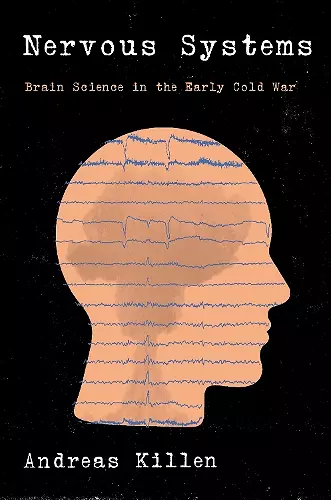Nervous Systems
Brain Science in the Early Cold War
Format:Hardback
Publisher:HarperCollins Publishers Inc
Published:21st Mar '23
Should be back in stock very soon

In this eye-opening chronicle of scientific research on the brain in the early Cold War era, the acclaimed historian Andreas Killen traces the complex circumstances surrounding the genesis of our present-day fascination with this organ.
The 1950s were a transformative, even revolutionary decade in the history of brain science. Using new techniques for probing brain activity and function, researchers in neurosurgery, psychiatry, and psychology achieved dramatic breakthroughs in the treatment of illnesses like epilepsy and schizophrenia, as well as the understanding of such faculties as memory and perception. Memory was the site of particularly startling discoveries. As one researcher wrote to another in the middle of that decade, “Memory was the sleeping beauty of the brain—and now she is awake.” Collectively, these advances prefigured the emergence of the field of neuroscience at the end of the twentieth century.
But the 1950s also marked the beginning of the Cold War and a period of transformative social change across Western society. These developments resulted in unease and paranoia. Mysterious new afflictions—none more mystifying than “brainwashing”—also appeared at this time. Faced with the discovery that, as one leading psychiatrist put it, “the human personality is not as stable as we often assume,” many researchers in the sciences of brain and behavior joined the effort to understand these conditions. They devised ingenious and sometimes transgressive experimental methods for studying and proposing countermeasures to the problem of Communist mind control. Some of these procedures took on a strange life of their own, escaping the confines of the research lab to become part of 1960s counterculture. Much later, in the early 2000s, they resurfaced in the War on Terror.
These stories, often told separately, are brought together by the historian Andreas Killen in this chronicle of the brain’s mid-twentieth-century emergence as both a new research frontier and an organ whose integrity and capacities—especially that of memory—were imagined as uniquely imperiled in the 1950s. Nervous Systems explores the anxious context in which the mid-century sciences of the brain took shape and reveals the deeply ambivalent history that lies behind our contemporary understanding of this organ.
"Andreas Killen's Nervous Systems focuses our attention on the history of “brain science” during the Cold War era, integrating histories of scientific ideas and techniques with a rich cultural history of public concerns about human nature in the age of totalitarianism, the possibility of “brainwashing” and mind control techniques, and the influence of new technologies and media (especially film and television) on our understanding the human mind. . . . I wonder if Killen might have left more room at the close of his book for a sequel – which doubtless, he would be superbly placed to write." — The Journal for the Society of the History of the Behavioral Sciences “In this compelling and lucidly written book, the historian Andreas Killen identifies the 1950s as the decade that revolutionized brain science, treating it not as a prelude to later developments in the 1980s and 90s, but on its own terms and in its own context. . . . [Killen] argues persuasively that 1950s brain science had two sides: a mind-control side and a transcendental side. . . . One great contribution of Killen’s book is to trace their interconnections to each other and to the brain sciences that fostered both.” — Nadine Weidman
ISBN: 9780062572653
Dimensions: 229mm x 152mm x 28mm
Weight: 488g
336 pages